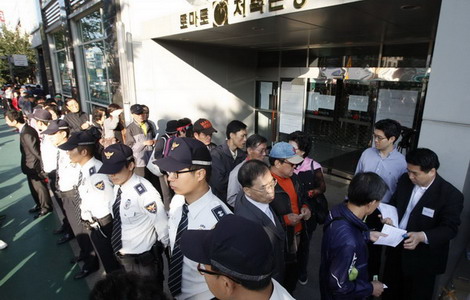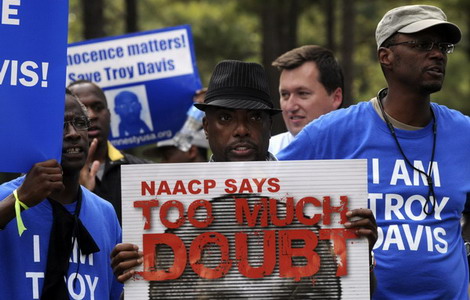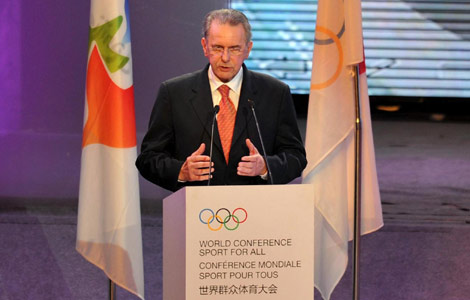Israel, Palestine should talk: US consultant
Updated: 2011-09-23 09:24
(Xinhua)
|
|||||||||||
UNITED NATIONS - The Israelis and Palestinians should sit down for direct talks "with no preconditions," because a solution to the conflicts involving the two peoples can only be found by the two parties themselves, not in the United Nations, said a leading US international political consultant in an exclusive interview with Xinhua Thursday.
George E.Birnbaum, CEO of the Atlanta-based GEB International, made the statement one day before the planned Palestinian move to formally present its application for full UN membership.
He predicted violence in the Middle East with the possible US veto on the Palestinian statehood bid at the UN Security Council and this will be an excuse for the terrorist groups, such as Al-Qaeda, who have often employed the Israeli-Palestinian conflict for their political gains.
Birnbaum, who has dual US and Israeli citizenship and used to consult for Israeli Prime Minister Benjamin Netanyahu's campaign in 1998 and later serve as Netanyahu's chief of staff for one and a half years, echoed the speech given by US President Barack Obama at the UN General Assembly on Wednesday, who threatened to veto any Security Council move to recognize Palestine as a member state.
Obama, who said "there was no shortcuts" to peace in the Middle East, urged Israelis and Palestinians to restart direct talks. The United States is a close ally of Israel and one of the five permanent members of the Security Council with veto power.
Despite the mounting pressure, including repeated US veto threats, Palestinian President Mahmoud Abbas is determined to press ahead with a formal bid for UN recognition when he is to speak at the General Assembly Friday.
The Isareli-Palestinian conflict, seen as a big test for the international peace efforts, overwhelmed other matters at the UN Headquarters in New York as the 193 member states gathered here for the annual high-level debate of the UN General Assembly.
Peace talks
For the Palestinian leadership, Birnbaum said, "the path to help your people is to sit down face to face with no preconditions and negotiate a final settlement that will both benefit the people of Palestine and the people of Israel."
"That can only take place one on one, no one can negotiate that for them, the two sides have to sit down without preconditions and negotiate some very tough issues," he said. "It will take leadership on both sides but they are going to have to sit down and agree on the borders, security arrangements and other such things but can only happen by the two sides."
With the US veto threat unmistakably looming, he said, "I think after that veto and after the vote fails, Israel should immediately call the Palestinians to meet anyplace, anywhere and enter into direct negotiations without preconditions."
Direct talks between Israel and Palestine stalled in October 2010, when Israel declined to renew a moratorium on its settlement building.
The diplomatic Quartet for Middle East peace, consisting of the UN, the EU, the US, and Russia had set the deadline for negotiating a final settlement between Israel and Palestine for September 2011. There has been no indication that direct negotiations between Israel and Palestine will resume.
"I think the peace talks should come very much alive after a US veto because that will make clear to the Palestinians you have no choice but to go into negotiations with the Israelis," he said. "Someone said very rightly: resolutions are not we need, solutions are what we need."
"And a solution can only be found by the two parties themselves and can't found in the UN," he said. "The UN can offer guidance, they can offer an opinion. But at the end of the day, if the two sides don't agree, there won't be peace."
Fearful of violence
"I'm fearful that no matter what happens in the next few days in the United Nations, there'll be violence," he said. "The Palestinian people are frustrated and they want results and they' re not going to get results."
"I do think President Obama has put himself in a very poor position politically and because of ...the speech that he gave yesterday," said Birnbaum. "I think it puts the United States interests - namely military men and women overseas and other assets of the United States in a greater danger. His speech is going to be used by terrorist organizations for recruitment, for radicalization and unfortunately for violence."
Related Stories
Palestine rejects Obama's plea to drop UN bid 2011-09-23 07:56
Palestine studys French proposals on statehood bid 2011-09-22 22:45
China firm on Palestine UN bid 2011-09-21 07:55
Palestine to formally apply for UN membership 2011-09-20 10:47
Hot Topics
Libya conflict, Gaddafi, Oil spill, Palace Museum scandal, Inflation, Japan's new PM, Trapped miners, Mooncake tax, Weekly photos, Hurricane Irene
Editor's Picks

|

|

|

|

|

|







